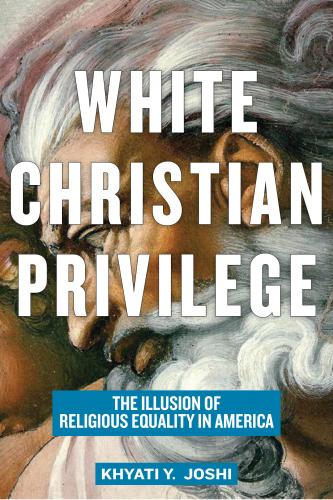White Christian Privilege
White Christian Privilege
THE ILLUSION OF RELIGIOUS EQUALITY IN AMERICA
Khyati Y. Joshi
NEW YORK UNIVERSITY PRESS
New York
NEW YORK UNIVERSITY PRESS
New York
© 2020 by New York University
All rights reserved
References to Internet websites (URLs) were accurate at the time of writing. Neither the author nor New York University Press is responsible for URLs that may have expired or changed since the manuscript was prepared.
Library of Congress Cataloging-in-Publication Data
Names: Joshi, Khyati Y., 1970– author.
Title: White Christian privilege : the illusion of religious equality in America / Khyati Y. Joshi.
Description: New York : New York University Press, 2020. | Includes bibliographical references and index.
Identifiers: LCCN 2019041467 | ISBN 9781479840236 (cloth) | ISBN 9781479835119 (ebook) | ISBN 9781479836468 (ebook)
Subjects: LCSH: Christianity—United States. | Religious discrimination—United States. | Christianity and other religions—United States.
Classification: LCC BR526 .J67 2020 | DDC 305.6/773—dc23
LC record available at https://lccn.loc.gov/2019041467
New York University Press books are printed on acid-free paper, and their binding materials are chosen for strength and durability. We strive to use environmentally responsible suppliers and materials to the greatest extent possible in publishing our books.
Manufactured in the United States of America
10 9 8 7 6 5 4 3 2 1
Also available as an ebook
for Kedhar Wallace Bartlett
may this book help us all build
a more perfect union for you
Contents
2 1. Christianity and American National Identity
3 2. Christianity and the Construction of White Supremacy
4 3. Immigration, Citizenship, and White Christian Supremacy
5 4. Everyday Christian Privilege
6 5. Voices of Christian Privilege
7 6. Making Meaning and Making Change
9 Notes
10 Bibliography
11 Index
Introduction
A pervasive Christian privilege prevails in the United States today. The United States is recognized as the most religiously diverse country in the world; yet, at the same time, Christianity—particularly Protestantism—has been integral to US national identity. Christian beliefs, norms, and practices, and indeed, a Christian way of looking at the world, infuse our society, enjoying countless legal, structural, and cultural supports whose roots reach back to the arrival of Europeans and the founding of the country. Protestant perspectives have become the “truths” at the bedrock of American society. Christianity dominates by setting the tone and establishing the rules and assumptions about who belongs or does not belong, about what is acceptable and not acceptable in public discourse. It is embedded in our institutions and dictates the structure of our weekend, from Sunday closings for the Christian Sabbath to alcohol sales laws. As a result, the “freedom of religion” enshrined in the pages of the Constitution does not always translate into everyday life. Christian prayer often opens public meetings and graduations all over the US, and the US Congress and state legislatures have always employed chaplains. Christianity has become bound up with US nationalism, with the inscription “In God We Trust” on our currency and our pledge to a nation “under God.” This Christian privilege, which undergirds our country’s institutions and cultural practices, offers advantages to Christians as they lead their lives, and disadvantages for members of minority religious groups.
This book explains how the effects of this privilege are acted out in our society and provides a historical and contemporary overview of how Christian privilege was created and why it has persisted. It demonstrates that Christian privilege in the United States has always been entangled with notions of White supremacy. Indeed, throughout US history, Christian, English, free, and White have been superimposed to form mutually supporting advantages based on the co-construction of religion, race, and national origin. These advantages—and corresponding disadvantages, for religious and racial minorities as well as for the nonreligious—persist at both the institutional and individual levels of society, and stand in the way of fulfilment of the promises of equality that were made in the nation’s founding documents and more recent laws. Yet, unlike racism, gender discrimination, or homophobia, Christian privilege often flies under the radar. It is so ingrained in our societal dynamics, it continues to be taken as “normal.” By shining a light on Christian privilege and its entwinement with White privilege, this book aims to equip readers with tools and ideas regarding how they can recognize it operating in our society and foster a more equitable environment for all.
Today’s religious and racial diversity requires that we do far more than just appreciate and embrace it or consider the ways individual experiences shape us. A social justice approach, in which we create change and mitigate bias, requires us first to recognize present circumstances as the product of history—of long and deeply-ingrained patterns and structures of advantage and disadvantage. This book sets out to examine the cultural, institutional, and legal infrastructure on which the experiences of Christians and religious minorities today have been built. Ultimately, it offers a historically informed road map of how Christian privilege developed and has influenced the American experiment from colonial times to the present. Drawing on interviews and personal narratives, it illuminates the impact of White Christian privilege in our workplaces, classrooms, and broader society, and offers strategies to expose and overcome its dynamics.
The book takes a hard look at three specific, related, and mutually supporting phenomena in the US: Christian privilege, Christian normativity, and Christian hegemony. Christian privilege is experienced at the individual level, in the everyday; it is manifest in unearned advantages that Christians receive and in the corresponding disadvantages religious minorities, atheists, and agnostics must deal with on an everyday basis. Many people think about bias and discrimination as dynamics that happen between two people. It can be easy to recognize a religious slur like
